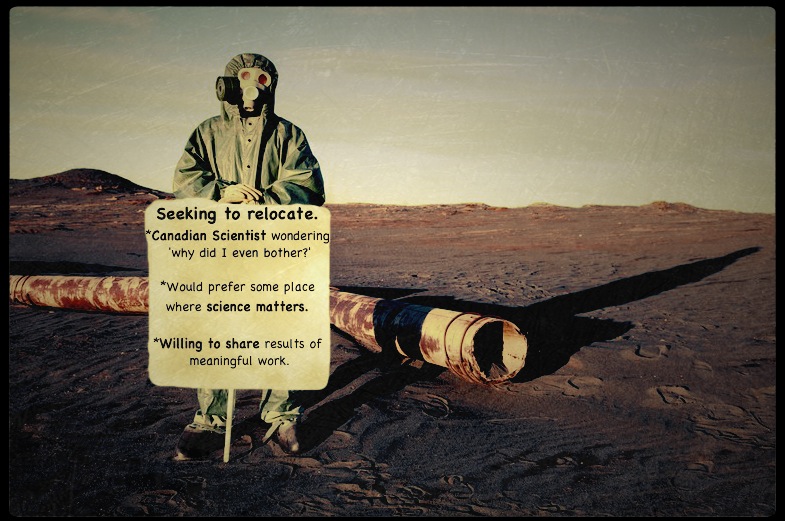Harper’s war on science continues with a vengeance, If Stephen Harper agenda succeeds, the result is a diminished Canada, afraid of open-ended questions and speculative science by Raffi Anderian, October 13, 2013, The Toronto Star
This week, after another tumultuous summer of scandal and the third prorogation of his tenure as prime minister, Stephen Harper will deliver his throne speech to Parliament to be read by the Governor General. The advance word has it that the focus of the speech and the legislative agenda it ushers in will be the protection of consumers. The choice of words is telling. This is a government interested mainly in what Canadians use and spend, and only passionate about those parts of Canada it can develop and sell off. It cares little about Canadians as citizens and even less about protecting Canada’s shared public goods and standing on guard for its natural capital.
Harper’s true agenda, pretty much all along, has been to dismantle the government’s great traditions of natural science and environmental stewardship, which until recently made Canada a world leader in both fields. This is a government waging a quiet legislative and administrative war on science — especially those fields of science dedicated to gathering and analyzing data on the health of Canada’s natural environment — and it has undone a century of good work with alarming efficiency since the passage of its sweeping omnibus budget bill in June 2012. Whatever is in this week’s throne speech, that budget remains the government’s most forceful statement of intent and clearest articulation of its overarching agenda. Christopher Plunkett, the government’s U.S. spokesperson, explained the aim of the bill to the Washington Post at the time with refreshing candour. “The idea is simple and straightforward: to make Canada the most attractive country in the world for resource investment and development.” Plunkett added that the bill would “enhance our world-class protection of the environment today for future generations of Canadians.” But this was rhetorical window-dressing, a bit of finery to provide the illusion of balance. And it was laughably transparent stuff at that, given that the government was in the process of slashing funding to numerous research facilities and programs, crippling many of the agencies responsible for monitoring environmental health and responding to environmental crisis, and rewriting the Fisheries Act so recklessly that four former Fisheries ministers (including two Tories) publicly campaigned against it.
The government’s war on science was well underway by the time of the omnibus budget bill — the long-form census long gone, a crime bill passed with little recourse to the data gathered by criminologists, scientists publishing papers on environmental topics already being muzzled — but the bill was its full-scale launch. It has proceeded apace since — and inspired the unprecedented scene of lab-coated scientists marching through the streets of Canadian cities in protest from Ottawa to Victoria. So what is the nature of this war on science? Above all else, it is a sustained campaign to diminish the government’s role in evidence-based policy-making and environmental stewardship in three simple ways: reducing the capacity of the government to gather basic data about the status and health of the environment and Canadian society; shrinking or eliminating government agencies that monitor and analyze that evidence and respond to emergencies; and seizing control of the communications channels by which all of the above report their findings to the Canadian public.
The ultimate goal is equally clear: to induce in the federal government a sort of wilful blindness, severely limiting its ability to see and respond to the impacts of its policies, especially those related to resource extraction. Do No Science, Hear No Science, Speak No Science — this is the essence of the Harper agenda. … “The kindest thing I can say is that these people don’t know enough about science to know the value of what they are cutting” — this was how David Schindler, the Experimental Lakes Area’s co-founder and one of the world’s pre-eminent freshwater biologists, characterized the Harper agenda for the press as the omnibus budget bill was being passed.
…
The government has announced that it will spend $24 million to tout the oilsands around the world, adding to the $113-million-plus it has already spent embedding the phrase “Economic Action Plan” in Canadian minds, and yet it can’t find $2 million a year to tell us what all that action planning will do to our freshwater. The implicit wager is that if the message is repeated often enough and the paycheques remain robust enough, Canadians won’t notice what they’ve lost. If the Harper agenda’s wager succeeds, the result is a diminished Canada, afraid of open-ended questions and speculative science, addicted to a shallow and brittle prosperity, and far out of step with its traditional allies on the 21st century’s defining issue of climate change.
…
Chris Turner is a Calgary-based journalist. His latest book, The War on Science: Muzzled Scientists and Willful Blindness in Stephen Harper’s Canada, was released last week. [Emphasis added]
Source: FrackingCanada

